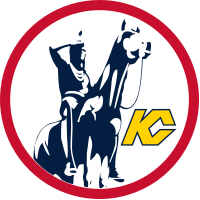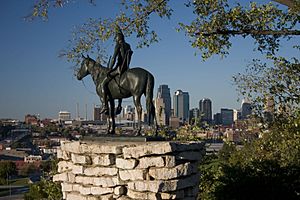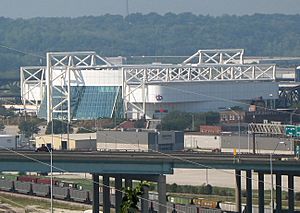Kansas City Scouts facts for kids
The Kansas City Scouts were a professional ice hockey team that played in the National Hockey League (NHL) for two seasons, from 1974 to 1976. After their time in Kansas City, the team moved to Denver and became the Colorado Rockies in 1976. Later, in 1982, the franchise moved again to New Jersey, where they are now known as the New Jersey Devils.
Quick facts for kids Kansas City Scouts |
|
|---|---|
 |
|
| Founded | 1974 |
| History | Kansas City Scouts 1974–1976 Colorado Rockies 1976–1982 New Jersey Devils 1982–present |
| Home arena | Kemper Arena |
| City | Kansas City, Missouri |
| Colors | Blue, red, yellow, white |
| Stanley Cups | 0 |
| Conference championships | 0 |
| Division championships | 0 |
Contents
The Scouts' Story: A Brief NHL Journey
The Kansas City Scouts were part of an NHL expansion in 1974. This was a time when the league added new teams after a period of growth that began in 1967. Kansas City Hockey Associates, a group of 22 investors, was given the chance to start a team on June 8, 1972.
Building a Home: Kemper Arena
Kemper Arena was built in Kansas City to be the home ice for the Scouts. This arena was also shared with the Kansas City Kings basketball team. The arrival of the Scouts and the Washington Capitals led the NHL to create four new divisions. The Scouts were placed in the Smythe Division within the Campbell Conference.
Choosing a Name: The "Scouts" Identity
The team's owners first thought about naming the team the "Kansas City Mohawks." This name was a mix of Missouri's postal abbreviation (MO) and Kansas's nickname, "Jayhawkers." However, the Chicago Black Hawks team objected because "Mohawks" sounded too much like their own name.
So, the team held a contest to find a new name. The winning name, "Scouts," came from The Scout, a famous statue in Penn Valley Park. This statue overlooks downtown and became the inspiration for the team's logo. The logo was designed by Gary Sartain of Hallmark Cards in 1973.
First Games and Early Challenges
The Scouts played their first game on October 9, 1974, against the Maple Leafs in Toronto. They lost 6–2, but team captain Simon Nolet scored the first goal in the team's history. The Scouts played their first eight games on the road while Kemper Arena was being finished. They lost seven of these games and tied one.
The team's home debut was on November 2, where they lost 4–3 to the Black Hawks. The very next day, the Scouts earned their first victory, beating the Washington Capitals 5–4.
Like many new teams, the Scouts struggled. In their first season, they won only 15 games, lost 54, and tied 11, earning 41 points. This was actually their better season.
A Tough Second Season
The Scouts' second season started with some hope. By late December, they were close to a playoff spot. However, the team then went into a long losing streak. They won only 12 games, lost 56, and tied 12, finishing with just 36 points. This remains the worst record in the history of the Scouts/Rockies/Devils franchise.
The last four games the Scouts ever played were exhibition games in Japan. On April 18, 1976, they defeated Washington 4–2, marking their final win, though it didn't count in the NHL standings.
During their two seasons, the Scouts had three different coaches: Bep Guidolin, Sid Abel, and Eddie Bush. They also had two captains: Simon Nolet and Guy Charron. The team never made the playoffs and won only 27 out of 160 games.
The NHL expanded quickly in the 1970s, and a rival league, the World Hockey Association (WHA), also started. This meant that there weren't enough top players to fill all the new teams. The Scouts, along with the Washington Capitals, struggled a lot. The Scouts also had problems with low attendance at their games.
Moving On: From Kansas City to Denver and Beyond
The Kansas City Scouts faced many challenges, including high player costs, financial problems, and poor performance. They averaged only 8,218 fans per game in their 17,000-seat arena. Because of these issues, the team's owners decided to sell the club.
The Relocation to Denver
A group from Denver, led by Jack Vickers, bought the team. On July 26, 1976, after just two seasons in Kansas City, the club moved and became the Colorado Rockies. They played in Denver for six seasons.
Then, in the fall of 1982, the team moved again to the East Coast and became the New Jersey Devils. The last active player from the Kansas City Scouts in the NHL was Wilf Paiement, who retired in 1988.
The Scouts and the California Golden Seals (who became the Cleveland Barons that same year) were the first NHL teams to move since the 1934–35 season.
The Scouts' Legacy in Kansas City
After the Scouts left, Kansas City continued to have minor league hockey teams, like the Kansas City Blades from 1990 to 2001. Today, Kansas City officials are interested in bringing an NHL team back to the city.
The New Jersey Devils team today usually doesn't talk much about their past as the Scouts or Rockies. However, inside the Prudential Center, the Devils' home arena, there is a mural that shows the former arenas of the Rockies and Scouts.
Scouts' Season Records
Here's a quick look at how the Kansas City Scouts performed in their two seasons:
| Season | GP | W | L | T | Pts | GF | GA | PIM | Finish | Playoffs | ||
| 1974–75 | 80 | 15 | 54 | 11 | 41 | 184 | 328 | 744 | 5th, Smythe | Did not qualify | ||
| 1975–76 | 80 | 12 | 56 | 12 | 36 | 190 | 351 | 984 | 5th, Smythe | Did not qualify | ||
| Relocated to Colorado | ||||||||||||
| Total | 160 | 27 | 110 | 23 | 77 | 374 | 679 | 1,728 | ||||
- GP = Games played
- W = Wins
- L = Losses
- T = Ties
- Pts = Points
- GF = Goals for (goals scored by the team)
- GA = Goals against (goals scored against the team)
- PIM = Penalties in minutes
Team Leaders
Team Captains
- Simon Nolet, 1974–1976
- Guy Charron, 1976
First Round Draft Picks
- 1974: Wilf Paiement (2nd overall)
- 1975: Barry Dean (2nd overall)
Broadcasters
Dick Carlson was the radio announcer for the Scouts in 1974–75. He later called baseball games for the Kansas City Royals. Gene Osborn was the main TV announcer for the team.
See also
- 1974 NHL Expansion Draft
- List of Kansas City Scouts players
- List of Kansas City Scouts draft picks
- List of Kansas City Scouts head coaches
- List of defunct NHL teams



